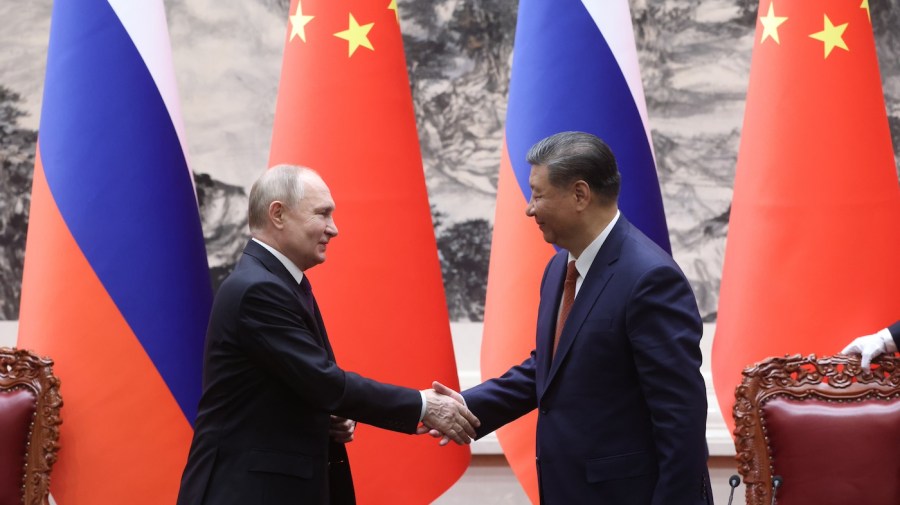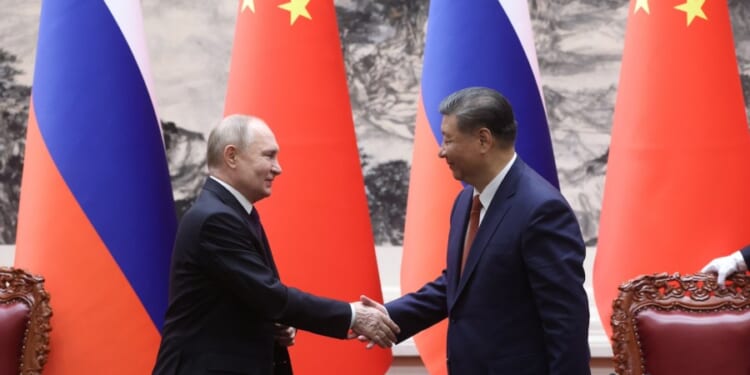
The Trump administration is sending mixed messages to America’s enemies — appeasing Russian aggression in Europe, while working to deter China in the Indo-Pacific.
Trump showed his personal hostility toward Ukraine and its president, Volodymyr Zelensky, in his first term when he withheld much-needed weapons systems unless Zelensky provided damaging information on the Biden family. Then, during his 2024 campaign, he promised to end Russia’s war there quickly, which could only be done by putting pressure on Ukraine, almost totally dependent on the U.S. for weapons, intelligence and moral and diplomatic support. Since his reelection, Trump has been doing precisely that, as was painfully demonstrated by his and JD Vance’s entrapment and berating of Zelensky in their infamous Oval Office meeting.
The clearly premeditated ambush of the Ukrainian president was the most shameful public display of American bullying of an ally the world has ever seen. Even Hitler allowed Chamberlain a more dignified humiliation — but then Chamberlain, unlike Zelensky, was already prepared to capitulate.
Trump’s adulation of Vladimir Putin, one of many strongmen he admires and seeks to emulate, and his siding with Russia’s position against Ukraine, was recently echoed by Trump’s chief negotiator, Steve Witkoff, during a visit to Moscow. He asserted that the Ukrainian people subjected to Russian domination in conquered parts of Ukraine “want to be under Russian rule.” “The question is,” he said, “will the world acknowledge that those are Russian territories?”
In contrast, the Trump administration is sending a message of resolve to China regarding America’s security commitments in the Indo-Pacific. Last week, Defense Secretary Pete Hegseth visited the Philippines, a U.S. treaty ally, where he declared the U.S. commitment to its security is “ironclad.” Hegseth called China “aggressive and coercive”and pledged that the U.S. will ensure “robust, ready and credible deterrence” across the Taiwan Strait.
Former President Biden repeatedly used the “ironclad terminology with Ukraine and NATO, despite the fact that his oft-expressed fear of World War III greatly inhibited his willingness to provide Ukraine with the military support it needed to defeat Russia’s aggression. The resulting stalemate was seized upon by Trump, though he has never expressed concern for the thousands of Ukrainian civilians captured, raped, tortured and murdered by the occupying Russian forces in their rampant war crimes.
Trump and his national security team err in addressing the security challenges from Russia, China, North Korea and Iran as separate and distinct issues. The China-Russia joint statement of a “no limits strategic partnership” specifically pledges reciprocal support for Russia’s position on Ukraine and China’s on Taiwan. Distracting American attention in one direction enables a move by another of the declared adversaries. The cumulative result is the erosion of the overall Western position and a deepening of its security predicament.
Trump can escape the geopolitical trap by reversing or substantially modifying his unstinting support for Putin while declaring an unequivocal commitment to defend Taiwan — without the administration dilution that followed each of Biden’s statements on the issue. A 180-degree turn on Ukraine would put both Putin and Jinping Xi off-balance, and potentially freeze any further aggressive moves by either.
Joseph Bosco served as China country director for the secretary of Defense from 2005 to 2006 and as Asia-Pacific director of humanitarian assistance and disaster relief from 2009 to 2010. He is a nonresident fellow at the Institute for Corean-American Studies, a member of the advisory board of the Global Taiwan Institute and member of the advisory board of The Vandenberg Coalition.











